 Copyright 2013, 2010, 2007 by Barrons Educational Series, Inc. All rights reserved. No part of this publication may be reproduced
Copyright 2013, 2010, 2007 by Barrons Educational Series, Inc. All rights reserved. No part of this publication may be reproduced
or distributed in any form or by any means
without the written permission of the
copyright owner. All inquiries should be addressed to:
Barrons Educational Series, Inc.
250 Wireless Boulevard
Hauppauge, NY 11788
www.barronseduc.com eISBN: 978-1-4380-9211-9 Revised eBook publication: July, 2013 CONTENTS INTRODUCTION:
MASTERING ADVANCED VOCABULARY FOR THE GRE About the Author Philip Geer (Ed.M.) has been teaching English and preparing students for the GRE and SAT for over thirty years in high schools and colleges in the United States and abroad. He is the author of a number of test preparation books, including Barrons GRE Verbal Workbook and 6 SAT Practice Tests , and is the director of Mentaurs Educational Consultants, which helps students around the world through Internet instruction. Students can visit for guidance in their GRE writing preparation.
The excerpts and sample sentences included in this book are for educational purposes only. They should not be taken to reflect the views of either the author or Barrons Educational Series, Inc. ACKNOWLEDGMENTS I would like to thank Susan Geer for her invaluable assistance in the preparation of this book. I am grateful to the following for permission to reproduce copyright material: Singapore Press Holdings for the article Delving into the Mind of a Great Thinker, Chomsky from The Straits Times Guide to Good English and Greater Knowledge, copyright 2005. Harper San Francisco for an extract from The Historical Jesus, The Life of a Mediterranean Jewish Peasant , John Dominic Crossan, copyright 1992 by John Dominic Crossan. Reprinted by permission of HarperCollins publishers.
This eBook may look differently depending on which device you are using to view it. This eBook also contains hyperlinks, which allow you to navigate through content, go to helpful resources, and click between all questions and their answers. Please note, for best optimization for the Fill-in-the-Blank exercises and reading passages, please turn your device horizontally. Introduction:
Mastering Advanced
Vocabulary for the GRE The Educational Testing Service (ETS) changed the format of the Graduate Record Exam (GRE) General Test in August 2011. The new Verbal Reasoning section of the GRE features more advanced reading passages with more demanding questions, as well as longer, more complex sentence-completion questions. The section no longer includes analogy or antonyms questions.
This is how ETS describes the new Verbal Reasoning section: Measure of ability to analyze and evaluate written material and synthesize information obtained from it, analyze relationships among component parts of sentences, and recognize relationships between words and concepts Emphasis on skills related to graduate work, such as complex reasoning Greater emphasis on higher cognitive skills and less dependence on vocabulary knowledge alone More text-based materials, such as reading passages A broader selection of reading passages Expansion of computer-enabled tasks (e.g., highlighting a sentence in a passage that serves the function described in the question) What does this mean for you as a student preparing for the new Verbal Reasoning section of the GRE? It means that you have to practice the skills of analyzing information in a passage, understanding the relationships among parts of a sentence, and comprehending relationships between words and concepts that are specified by ETS. To do this you should work through the skills section and practice tests in a reputable GRE General Test guidebook, such as Barrons GRE Verbal Workbook . You also need to read widely, thinking critically about what you read. Read good books and periodicals such as The New York Times , the Christian Science Monitor , The Atlantic , The New Yorker , Time , The Economist , and Scientific American . Besides reading these, you should also read some material at an even higher level. This will improve your ability to understand complex sentence structure and follow a sophisticated line of reasoning.
If, as you read, you look up words you do not know in a good dictionary, you will also improve your vocabulary. Speaking of vocabulary, does the change in the GRE Verbal Reasoning section really mean that you no longer need to have a good vocabulary to do well on the test? The answer is no. Look at what ETS says about the new test: Greater emphasis on higher cognitive skills and less dependence on vocabulary knowledge alone (italics). This means that having a good vocabulary is still very important. Although antonym and analogy questions emphasizing knowledge of vocabulary alone have been dropped, the revamped test does place a considerable emphasis on advanced vocabulary, especially in the new sentence equivalence and text completion questions that have been introduced. Lets examine some of these types of questions and answer choices to see how important vocabulary is on the revised GRE.
SENTENCE-EQUIVALENCE AND TEXT-COMPLETION QUESTIONS In the sentence-equivalence question below, you must choose two answers that could correctly complete the sentence. It would be difficult to imagine two more different personalities
Liz is shy and taciturn, while Stan is outgoing and __________  salubrious
salubrious  laconic
laconic  specious
specious  loquacious
loquacious  doctrinaire
doctrinaire  talkative Can you arrive at the correct answers to this question without knowing the meaning of the advanced word in the sentence, taciturn (incommunicative, not inclined to speak much), and the meanings of the five advanced words that appear in the answer choices? If you dont know the meanings of salubrious , laconic , specious , loquacious , and doctrinaire , you will be forced to guess one of the correct answers to this question, (D) loquacious , which means (F) talkative , the second correct answer. Not all sentence-equivalence questions are so vocabulary dependent but you can expect quite a few to require knowledge of very advanced words. Lets take a look at another type of question that requires knowledge of advanced words. In the first text-completion question below, you must choose one answer to fill in the blank.
talkative Can you arrive at the correct answers to this question without knowing the meaning of the advanced word in the sentence, taciturn (incommunicative, not inclined to speak much), and the meanings of the five advanced words that appear in the answer choices? If you dont know the meanings of salubrious , laconic , specious , loquacious , and doctrinaire , you will be forced to guess one of the correct answers to this question, (D) loquacious , which means (F) talkative , the second correct answer. Not all sentence-equivalence questions are so vocabulary dependent but you can expect quite a few to require knowledge of very advanced words. Lets take a look at another type of question that requires knowledge of advanced words. In the first text-completion question below, you must choose one answer to fill in the blank.
| remonstrate |
| exacerbate |
| understand |
| establish |
| mitigate |
If you dont know the definition of mitigate (to cause to become less harsh, severe, or painful), you will not be able to answer this question correctly.
| remonstrate |
| exacerbate |
| understand |
| establish |
| mitigate |
If you dont know the definition of mitigate (to cause to become less harsh, severe, or painful), you will not be able to answer this question correctly.
Also, the more words you know in the other answer choices, the more confident you can be in answering the question. Heres a question that requires you to choose words to fill in two blanks. Some scholars deny that there is a direct correlation between the scientific theory of relativity and intellectual fashions in the arts, pointing out that many important modernist works such as Igor Stravinskys (i) __________ symphony The Rites of Spring (ii) __________ the theory of relativity.
Next page
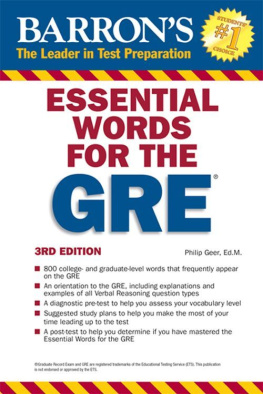
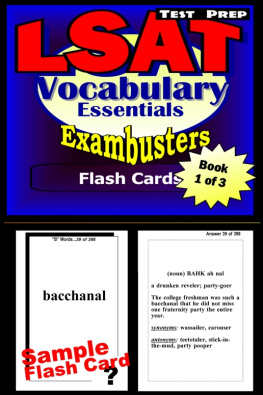
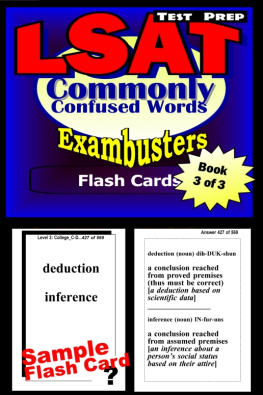
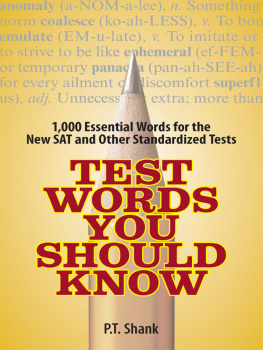
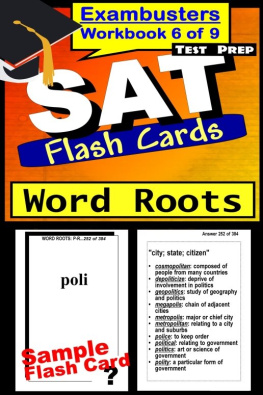

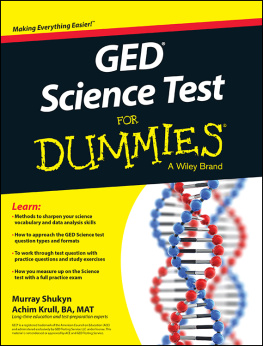
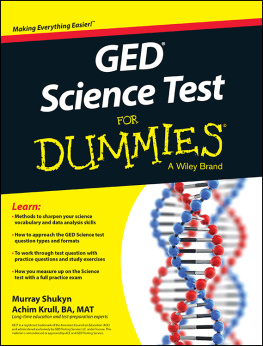
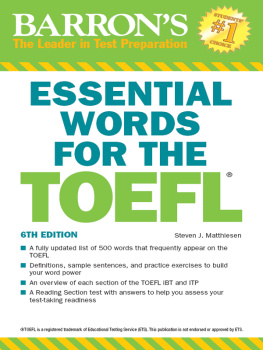
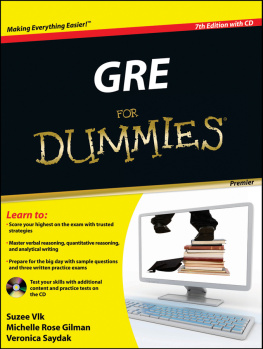
 Copyright 2013, 2010, 2007 by Barrons Educational Series, Inc. All rights reserved. No part of this publication may be reproduced
Copyright 2013, 2010, 2007 by Barrons Educational Series, Inc. All rights reserved. No part of this publication may be reproduced salubrious
salubrious  laconic
laconic  specious
specious  loquacious
loquacious  doctrinaire
doctrinaire  talkative Can you arrive at the correct answers to this question without knowing the meaning of the advanced word in the sentence, taciturn (incommunicative, not inclined to speak much), and the meanings of the five advanced words that appear in the answer choices? If you dont know the meanings of salubrious , laconic , specious , loquacious , and doctrinaire , you will be forced to guess one of the correct answers to this question, (D) loquacious , which means (F) talkative , the second correct answer. Not all sentence-equivalence questions are so vocabulary dependent but you can expect quite a few to require knowledge of very advanced words. Lets take a look at another type of question that requires knowledge of advanced words. In the first text-completion question below, you must choose one answer to fill in the blank.
talkative Can you arrive at the correct answers to this question without knowing the meaning of the advanced word in the sentence, taciturn (incommunicative, not inclined to speak much), and the meanings of the five advanced words that appear in the answer choices? If you dont know the meanings of salubrious , laconic , specious , loquacious , and doctrinaire , you will be forced to guess one of the correct answers to this question, (D) loquacious , which means (F) talkative , the second correct answer. Not all sentence-equivalence questions are so vocabulary dependent but you can expect quite a few to require knowledge of very advanced words. Lets take a look at another type of question that requires knowledge of advanced words. In the first text-completion question below, you must choose one answer to fill in the blank.